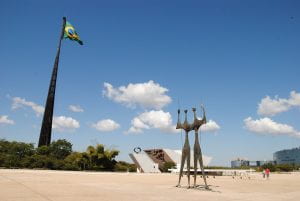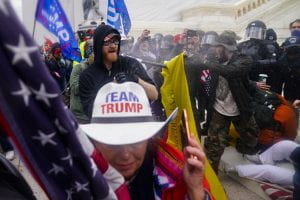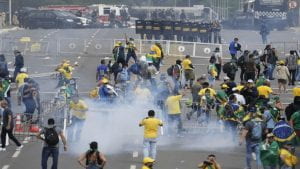People filled the plaza in the place where all three powers of governance meet in Brasília, Brazil. A sea of green and gold as hundreds of citizens displayed their nation’s colors before entering the seats of power, destroying property, and overpowering the police. People climbed to the roof of the Congress building and unfurled a flag that read “intervention.”
Raging riots in the wake of a new presidency
On January 8th, 2023, citizens stormed Brazil’s Congress, Supreme Court, and presidential offices in objection to the newly incumbent President Luiz Inácio Lula da Silva. Their rage and fear came after the loss of former president Jair Bolsonaro and a false belief that the October 2022 election had been rigged.
Bolsonaro had steadily fostered suspicion against the integrity of Brazil’s voting system for years, even making such false claims on his 2022 campaign trail. After being ousted, his refusal to concede, alongside his previous claims of fraud, left his supporters reeling. Many demanded for months that the military step in and deny letting da Silva take office on Jan. 1st.
While the military did not listen to the demands, they did not completely rule out the possibility of vote rigging either. In spite of the fact that the Defense Ministry found no evidence of fraud during the election, one comment stated that “It is not possible to guarantee that the programs that were executed in the electronic voting machines are free from malicious insertions that alter their intended function.” No evidence has been found to support this conjecture either.

In the wake of growing suspicions and conspiracies, Bolsonaro supporters, known as “Bolsonaristas,” stormed the Three Powers Plaza (named after the three branches of governance located there) in a massive demonstration that soon turned violent.
The facts and events of the U.S. and Brazil riots
The similarities between January 6th, 2021 in the United States and January 8th, 2023 in Brazil are stark. Aside from the dates themselves, both these events signal serious declines in trust in democratic institutions.
In both instances, supporters overpowered police before entering capitol buildings, breaking windows, stealing items, and documenting their own crimes in the offices of elected legislators.

When capitol riots in the U.S. occurred, it was during the ceremonial certification of the election results and interrupted this important step before President Biden’s inauguration. On the other hand, in Brazil, President da Silva had already taken office nearly a week before. When demonstrators arrived, congress was not in session, nor was anyone within the buildings that Sunday.

This distinction, while slight, is significant to note because, during the time of the riots in Brazil, the actual transition of power had already occurred. In the case of the U.S., the symbolism surrounding the counting of ballots represented a key component of the democratic transition.
Moreover, in the U.S., citizens only targeted the Congress building, while Bolsonaristas also attacked the presidential palace and Supreme Court. This aligns further with claims that Bolsonaro had made during his term about the Supreme Court conspiring against him.
Of most importance, and concern, is how federal police responded initially in Brazil. In the case of the U.S., many sources reported that security forces had been unprepared for such escalations, but in Brazil, channels to “invade Congress” had formed on the apps WhatsApp and Telegram. These channels had gathered tens of thousands of followers. Bolsonaristas had formed groups across the country with the intention of renting buses to the capitol for “violent anti-government action.”
In spite of the clear evidence pointing towards citizen insurrection, the Federal district police and military police took no action. During the riots, many security forces were seen smiling, taking photos, and interacting with Bolsonaritas.
Transnational connections in far-right groups
Just as former president Donald Trump had attempted to undermine the legitimacy of the 2020 election result, so too had Bolsonaro engaged in making the same false claims over vote-rigging. Incidentally, Bolsonaro had come to be known as the “Trump of the Tropics” during his time in office. But false claims over vote rigging don’t end with these two heads, former aids, current politicians, and social media play a crucial role in fostering anti-democratic extremism.
Two years after the riots in the U.S., concerns over the legitimacy of Brazil’s election have been a contentious topic among far-right groups in the United States. These groups do not know anything about Brazilian politics, however, social media has connected the two continents to reinforce illegitimate beliefs about the accuracy of democratic processes.

During the 2020 U.S. election, conspiracies over the voting machines manufactured by Dominion Voting Systems and Smartmatic had been extremely popular in supporting false claims of vote rigging. Now, these conspiracies have re-emerged but in the context of Brazil, circulating online and in far-right media, despite the fact that neither company’s products were used in Brazil. These lies have found their way onto Twitter, Facebook, Reddit, Truth Social, and Gettr (alternative platforms popular on the right).
During the Brazilian riots, Bolsonaristas held a banner that stated “We want the source code” in both Portuguese, the nation’s most spoken language followed by Spanish, and English. This is a direct reference to the conspiracies spread first in the U.S. further emphasized by the languages of choice.
Moreover, dating back to October, Steven Bannon, former Trump aid, has been drawing parallels between the Brazilian election and the U.S. on his podcast. Sites like The Gateway Pundit have published blogs the morning after the first round of elections in Brazil about “MASSIVE fraud” and Matthew Tyrmand, a conservative activist, has repeatedly pushed the idea that Smartmatic machines were used in Brazil to tens of thousand on Twitter and Gettr.
Incidentally, Bannon, who has also been pushing for supporters to run in local elections and become election workers and poll watchers, has developed close ties with Bolsonaro’s family.
According to Madeline Peltz the Director of Rapid Response at Media Matters, a left-leaning non-profit and media watchdog, “There’s a sympathetic audience for it in Brazil, and there’s certainly a sympathetic audience for it in the States. The building of a coalition between those two groups is really a win-win for Steve Bannon and the right-wing movement broadly.”
In Germany over a dozen were arrested in 2021 for planning to overthrow the government, while in Australia, the U.S.-centric conspiracies over machine-based voting fraud (even targeting Dominion again) had to be publicly debunked by the Electoral Commission.
In the end, far-right groups are taking inspiration in each other. Not from a shared set of goals or identities, but from their refusal to accept a candidate’s loss stemming from deep-seated anti-democratic stances. With social media to bridge distances and languages, it has become ever harder for governments to stop false election claims and silence the dangerous rhetoric of election deniers.
Political environments and human rights
The United Nations maintains democracy as one of its core values alongside promoting international cooperation and human rights.
Democracy does not always equal or improve human rights. However, the values outlined in normative human rights frames overlap significantly with democratic governance. Democracy provides environments that are more likely to support human rights, as is the case with Articles 8 (right to national tribunals), 9 (arbitrary arrest), 10 (right to a fair trial), and 12 (arbitrary interference) in the Universal Declaration of Human Rights (UDHR) just to name a handful.
In countries with weak rule of law, government institutions, and corruption, there is a 30 to 45% increase in the risk of civil war and a higher risk of extreme criminal violence. Any country can suffer from one or more of these factors which then threatens the personal security of people and their human rights.
According to Freedom House, a non-profit that conducts research on democracy, human rights, and political freedom, the last 16 years have been marked by a democratic decline globally. For example, President Nayib Bukele in El Salvador has undermined democratic institutions designed to check executive power. In Peru, riots for the past five weeks have demanded the government disband the legislature and president in favor of new elections, and in the most extreme case, that the military step in to rule. As the youngest democracy in Latin America (restored in 2001), Peru has long suffered poor living conditions which have made the population steadily view the government as corrupt, ineffective, and unfair. In fact, a 2021 poll from Vanderbilt University found that only 21% of the population was satisfied with democratic rule.
Brazil is a young democracy, previously under a military dictatorship between 1968 and 1985. Considering Bolsonaro’s praise of military rule in office, and the attack on all three democratic institutions, the riots on Jan. 8th signal a larger issue 一 a rejection of the democratic results overall.
In the case of Brazil specifically, Bolsonaro’s term was marked by rises in violence, especially against Queer people, diminished environmental protections, and displacement of indigenous peoples.
Conclusion
While citizens always have the right to self-determination, this does not give anyone the right to inflict harm on someone’s personal security or engage in violent acts. In a democracy, tides are always able to change, switching between ideologies and agendas based on the popular vote of the nation. In the case of Chile, violent demonstrations did prompt a constitutional rewrite, however, once this democratic process began the violence ceased and turned towards peaceful demonstrations.
As President da Silva begins his new term, he will be faced with many challenges to unite Brazil. However, he has already taken major steps in the wake of the riots, arresting hundreds in a single day, beginning an investigation, and removing individuals from security positions.
For us, we must remain committed to the values of human rights, recognizing the inherent dignity of everyone and continually striving for equity and equality. To do this, we must have faith in the governments that ensure us these rights, and in the cases that do not, we must organize peacefully, research and reach out, and live our lives by our belief in human rights.
To learn more and get involved, visit these sites and blogs below:
- Freedom House
- Human Rights Watch
- A Bright Future 一 Recent Human Rights Victories
- Follow @uab_ihr for Speaker events, blogs, and to learn more about supporting human rights locally and globally


Published by